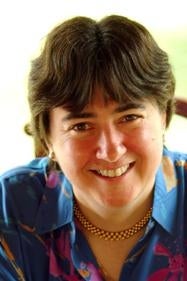
Catherine Rosenberg
Work on research problems related to the future of wireless networks is the focus of a new partnership between Waterloo Engineering researchers and Cisco Canada.
Catherine Rosenberg, who was announced today as the Cisco Research Chair in 5G Systems, will head a multidisciplinary team of experts to help the industry leader in networking prepare for the introduction of 5G.
Catherine Rosenberg
“This allows us to work on practical and very relevant problems related to 5G, and I am very excited about working with Cisco,” said Rosenberg, an electrical and computer engineering professor and Canada Research Chair in the Future Internet.
The research chair, part of a larger commitment to the University of Waterloo by Cisco, is backed by $1 million in funding over five years.
Also included are donated interactive displays, and contributions to a service that links businesses to University innovation and a lab to spark entrepreneurial ideas.
"One of our imperatives is to invest in initiatives that drive innovation for Cisco and increase Canada's competitiveness," said Rola Dagher, president of Cisco Canada. "We are excited to further evolve our relationship with Waterloo and look forward to increased collaboration."
The next generation of wireless systems, 5G is a family of technologies, including new frequency bands, that will enable faster data transfer and reduced delays for greatly improved wireless service.
It is expected to power the Internet of Things, allow streaming to mobile devices even when users are travelling at high speeds, and provide reliable service for critical applications such as remote surgery and autonomous vehicles.
“We are generating increasing amounts of wireless traffic as our applications grow more bandwidth hungry,” said Rosenberg. “5G will deliver better service to fixed and highly mobile users and scale to provide connectivity to millions of things.”
Waterloo a 'powerhouse in connectivity'
Research related to the new chair will concentrate on the use of 5G in business settings, from large retailers to offices and hospitals, to help Cisco bring the benefits to its customers.
Rosenberg has already started working with Cisco researchers around the world and assembled a team of Waterloo colleagues to tackle issues around networking, security and software dependability for 5G.
Her collaborators at Waterloo Engineering include professors Patrick Mitran, Slim Boumaiza, Mahesh Tripunitara, Arie Gurfinkel, Lin Tan and Werner Dietl. The goal is to eventually establish a team of about 20 people including graduate students.
“The idea is to create synergy, to address a set of problems that cannot be solved by a single person, but can be solved by a multidisciplinary team,” Rosenberg said.
The partnership is a great fit, she said, because of Cisco’s vast experience in enterprise networking and Waterloo’s critical mass of experts in connectivity, including about 50 in the Faculty of Engineering alone.
“We are, I think, a powerhouse in connectivity in Canada and in the world,” said Rosenberg.